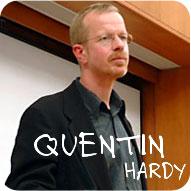A Tour of the Humanities in 2050
Media have changed ideas about the self and society for centuries, from vernacular print in the Reformation to the 20th Century’s reference to life’s intense moments as being “like a movie.” What might happen as today’s media blur accelerates? It is not just that news, information and entertainment are in continual overlap, with print, audio and visual streams interchanging. The ideal is that no information is lost, and we are “always on,” in perpetual connection with continual feeds. In this talk I will discuss some of the major trends in their historic context, and sketch out the likely consequences.
 Quentin Hardy is Silicon Valley Bureau Chief for Forbes magazine. He had been a senior Editor for Forbes from March 1999 to April 2002, covering the technology industry from the Silicon Valley bureau. Prior to joining Forbes, Hardy spent eight years at The Wall Street Journal. While based in the Journal's Tokyo bureau from 1991 through 1994, he reported on the Japanese banking crisis and market collapse. From 1994 until 1999, he covered the wireless industry and Silicon Valley culture from the paper's San Francisco office. He also worked at AP/Dow Jones newswire in Tokyo from 1988 to 1991, covering Asian energy markets and natural resources. Hardy is a regular on "Forbes on Fox," a weekly business news show on Fox News Channel, and he hosts numerous panels on technology and business at events around the US. Hardy is a graduate of Kenyon College and has a Masters degree from the University of London. In 1995 he was awarded a Knight-Bagehot Fellowship from the Columbia University School of Journalism.
Quentin Hardy is Silicon Valley Bureau Chief for Forbes magazine. He had been a senior Editor for Forbes from March 1999 to April 2002, covering the technology industry from the Silicon Valley bureau. Prior to joining Forbes, Hardy spent eight years at The Wall Street Journal. While based in the Journal's Tokyo bureau from 1991 through 1994, he reported on the Japanese banking crisis and market collapse. From 1994 until 1999, he covered the wireless industry and Silicon Valley culture from the paper's San Francisco office. He also worked at AP/Dow Jones newswire in Tokyo from 1988 to 1991, covering Asian energy markets and natural resources. Hardy is a regular on "Forbes on Fox," a weekly business news show on Fox News Channel, and he hosts numerous panels on technology and business at events around the US. Hardy is a graduate of Kenyon College and has a Masters degree from the University of London. In 1995 he was awarded a Knight-Bagehot Fellowship from the Columbia University School of Journalism.










